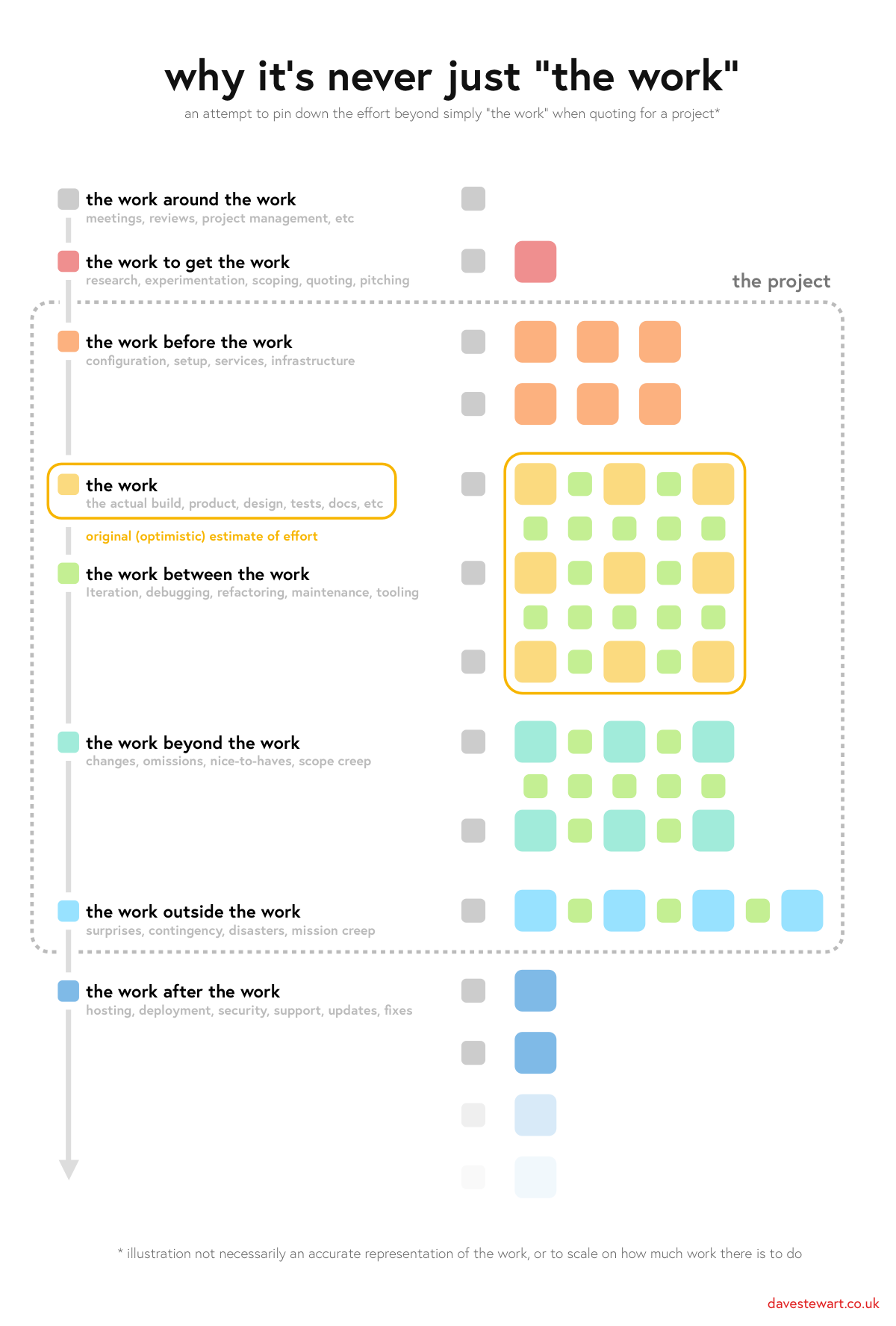If you only read one thingTo Build a Top Performing Team, Ask for 85% Effort (14 minute read) CEOs don’t believe me. They want developers to work at a 125% level for maximum output. Which makes the team fail, trash and productivity will be low. “An outdated way of thinking about peak performance is “maximum effort = maximum results.” It doesn’t actually work that way in reality, but many managers still believe that it does.” So now that this is in Harvard Business Review, perhaps your CEO will listen. You this to them. https://hbr.org/2023/06/to-build-a-top-performing-team-ask-for-85-effort
Graph of the week
The work is never just “the work” (13 minute read) “Estimating is hard because you can’t predict the future.” An article with some great insights on estimation, how to estimate, and what needs to be done beside coding. https://davestewart.co.uk/blog/the-work-is-never-just-the-work/ Stories I’ve enjoyed this weekManage process before people (4 minute read) I’m a people manager. I love working with people. Most of my 1:1 are about people development, helping developers and managers succeed. But this article has some good points, if you want less management, look more at processes. https://world.hey.com/dhh/manage-process-before-people-20736695 What Actually Drives Productivity (20 minute read) “Developer experience (DevEx) encompasses how developers feel about, think about, and value their work. [..] A common misconception is that DevEx is primarily affected by tools. Our research, however, shows that human factors such as having clear goals for projects and feeling psychologically safe on a team have a substantial impact on developers’ performance.” https://queue.acm.org/detail.cfm?id=3595878 🤖 GPT Best Practices (10 minute read) You can greatly increase the productivity of using ChatGPT with these best practices (I didn’t know most of them), right from the creators of ChatGPT. https://platform.openai.com/docs/guides/gpt-best-practices Onboarding Antipatterns (4 minute read) Companies spend so much time on recruiting. And then totally screw up with onboarding. One that I might add: Use onboarding to test the new employee. A new hire should work as expected one month after hiring. If not, tell them. And if they don’t change course in the next month, ask yourself: With all I know, would I hire that person again? If not, you need to let the person go. https://www.dcaulfield.com/onboarding-antipatterns 💥 How Complex Systems Fail (16 minute read) Understanding how complex systems fail is essential for CTOs—the role that mostly deals with complex systems and whose head is chopped off if they fail. This includes my failure and crisis model: “Catastrophe requires multiple failures – single point failures are not enough.” https://how.complexsystems.fail/ Making a plan (11 minute read) Sorry yes, Medium. or Substack. I don’t care. One of those “pay to read” sites. I usually don’t link to those. But if you’re lucky to be able to read it, the author is right. “I’m talking about making a plan. A plan for something you want to implement.” I stumbled across this too—if you have a plan, you’re more productive as a coder. With excellent senior developers, I’ve experienced the same. They will write down a detailed plan on what to do and what to change—looking at the code (!)—in a Scrum meeting. One of the tricks to make Scrum work. https://registerspill.thorstenball.com/p/making-a-plan Creating Your Own ChatGPT: A Guide to Fine-Tuning LLMs with LoRA (13 minute read) This technique is very important. It can be your first step into really adopting AI into your company (using ChatGPT to write landing pages is not what being an AI company is about). And the article gives simple and detailed steps. Give this to on of your developers now to work on. https://plainenglish.io/blog/creating-your-own-chatgpt-a-guide-to-fine-tuning-llms-with-lora And here is an Open LLM Leaderboard for data models. and a short introduction to LLMs https://blog.sylphai.com/introduction-to-large-language-models Japan Goes All In: Copyright Doesn’t Apply To AI Training (3 minute read) The world will split on this line. The successful countries will go the way of Japan. I fear for the EU. https://technomancers.ai/japan-goes-all-in-copyright-doesnt-apply-to-ai-training/ How Much Memory Do You Need to Run 1 Million Concurrent Tasks? (9 minute read) I love evidence-based software engineering. We don’t have enough of it. We don’t have enough facts to decide on a programming language. Plus in this case, with 1 million tasks, Java uses around 1.5gb of memory, Go (!) uses 3gb of memory, and Elixier uses 4gb. I like Go a lot, and it is my goto language today. But it is driven by marketing, especially around goroutines. And this test shows. “The distance between Go and others increased. Now Go loses over 12x to the winner. It also loses over 2x to Java, which contradicts the general perception of JVM being a memory hog and Go being lightweight.” You might also impress your developers with this knowledge https://pkolaczk.github.io/memory-consumption-of-async/ 💻 Building LLM applications for production (25 minute read) Some good, practical insights and tips on how to run LLMs. https://huyenchip.com/2023/04/11/llm-engineering.html The big guns are out. If you don’t attend the office at Google, no raises, and you’re on the way out. I think this will work for Google (b/c of their brand in your CV and their salary) but not for you. Every company except a very few will lose this coming battle. https://fortune.com/2023/06/08/google-remote-work-office-attendance-performance-review/ Stop working for outsourcing companies as a software engineer (2 minute read) “In outsourcing companies, software quality is about avoiding complaints from clients. That’s it.” - The truth straight from the horse’s mouth. This has many consequences on how to manage an outsourcing project. The most important: If you ever plan to insource the project, you need constant code reviews done by your developers. https://olzhasar.github.io/posts/stop-working-for-outsourcing-companies/ The Simple Joys of Scaling Up (19 minute read) Scaling up vs. Scaling out. An interesting point, Scaling up (better hardware) is exponential, Scaling out is linear (more servers). The article is an argument that we neglect scaling up. “The first and primary rationale for scaling out is that people believe they need multiple machines to handle their data.”* - and they are wrong. Join the CTO newsletter! | |

